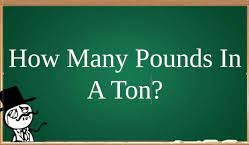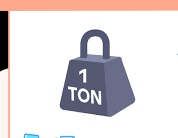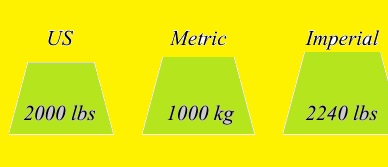In this post, we will cover How Many Pounds Are in a Ton? Definition, Meaning, Weight, Facts. The answer to this question is 2000 pounds. Ton word is used to define the unit of mass, which is a short ton, but it varies based on countries and periods. Here we will learn the different parameters of weight of pounds and tons. So let’s get started with How Many Pounds Are in a Ton?
Pounds and Tons Introduction
What is a Pound?
A pound is a unit of mass used in the British imperial and US customary systems of measurement. There are many definitions used, commonly used is international avoirdupois pound which is equal to 0.45359237 kilograms, and divided into 16 avoirdupois ounces. The standard symbol for pound is lb.
What is a Ton?
The unit of weight in the avoirdupois system is 2000 pounds in the US and 2240 pounds in Britain. The metric ton used in other countries is 1000 Kg, equivalent to 2,204.6 pounds of avoirdupois.
Short Ton, Long Ton, and Tonne Conversions
- 1 short ton = 0.89 long tons = .9 tonnes = 2000 pounds = 907 kg
- 1 long ton = 1.12 short tons = 1.01 tonnes = 2240 pounds = 1016 Kg
- 1 tonne = 0.98 long tons = 1.1 short tons = 2204 pounds = 1000 kg
differences between the three units of mass:
| Unit of mass | Definition | Equivalent to |
|---|---|---|
| Short ton | 2,000 pounds | 907.18474000 kilograms |
| Long ton | 2,240 pounds | 1,016.0469088 kilograms |
| Metric ton | 1,000 kilograms | 2,204.62262185 pounds |
Symbol of Ton and unit of a ton
| Tonnes | Equivalents | |
|---|---|---|
| Name | Symbol | Tonnes (t) |
| tonne | t | 1 t |
| kilotonne | ktǂ | 1,000 t |
| megatonne | Mt | 1,000,000 t |
What is Mt in Weight?
The Mt in weight is metric tons. In the avoirdupois system of unit, a ton is the main unit of weight. it is worldwide used.
In the US one metric ton is 907.18 kilograms or two thousand pounds. In Britain per metric ton is 1016.05 kilograms or two thousand two hundred and 40 pounds.
Ton as a Unit of Volume
Ton is used as a measurement of energy power and volume. The freight or ship cargo capacity is also measured in tons. The term freight is goods that moved from one point to another through any source.
Ton or metric ton is used as a unit of volume. The measurement is 40 cubic feet. The 100 cubic feet is called a register ton. 35 cubic is also called a long ton of seawater.
The unit of imperial US customer also ton or metric ton is spelled Ton in English. But are different in mass
Ton: Fun Facts
- In 1985 the use of different imperial units stopped, also ton, by the Weights and Measures Act of the UK
- The weight of full full-grown male African elephant can be about 7 metric tons, which is equal to 15,400 pounds (lbs).
- The small car weight is 1 ton.
- The blue whale’s weight is about 190 tons.
One ton is how many pounds
Ton is equal to 2,000 pounds (907.18 kg) in the United States (the short ton
What’s the Difference Between a Short Ton, a Long Ton, and a Tonne (Metric Ton)?
Short Ton
The United States of America never used a metric system for things measurements. But they use a system known as customary units. For measuring mass, this system employs pounds and ounces with tons.
The USA ton known as a short ton is equal to 2000 pounds.
Long Ton
The UK uses a mixture of the metric system and the older imperial system for measurements. it means they measure mass in kilograms and other units called stones. The ton which uses imperial measures is somewhat heavy as compared to the US, UK ton is known as a long ton tha is equal to 2240 pounds.
Tonne (or Metric Ton)
In some countries, there is a metric system used and they use grams and kilograms for measuring mass.
The metric ton is not officially known as a metric ton and it is known as tonne. One tonne is 1000 kilograms and equal to 2,204.6 pounds.
Differences between the three units of mass:
| Ton type | Weight in pounds |
|---|---|
| Long ton | 2,240 |
| Short ton | 2,000 |
| Metric ton | 2,204.6 |
Why Are There So Many Different Tons?
Tons in the Ocean
At sea, tons are normally used for measuring ships, and tons are used for volume rather than mass.
Deadweight Ton.
Volume measurement of ship carrying capacity like cargo, ballast, crew, and supplies. It is defined in tonnes or long tons.
Register Ton (or Tonnage).
The volume measurement of cargo capacity ship. Tonnae is not the same as the weight of a ship called displacement.
Ton Class.
The volume measurement defines the yachts based on the capacity of the hold.
Displacement Ton.
It measures the weight of the ship. it is called displacement since we measure it by measuring the volume of water that the ship displaces and converting volume into weight.
Tons in the Ground
Dry Ton (or Tonne).
The measurement of the mass of material that is normally wet but dried for transportation
Assay Ton.
It is not a measure of unit that is either 29 1⁄6 grams (short assay ton) or 32 2⁄3 grams (long assay ton) and less than a pound.
it is a standard quantity of ore necessary for testing the ores of precious metals.
Ton Shortweight and Ton Longweight
Deadweight Ton
The deadweight ton is a measurement of a ship’s carrying capacity and is normally measured in tonnes or long tons.
Harbour Ton
The harbour ton is defined as 2000 pounds or a short single ton. It was used in 20th-century South Africa.
Assay Ton
It is called AT, it is not referred to as a unit of measurement but is used for assaying ores of costly metal. There are two types, short assay ton and long assay ton. The short assay ton is 29 1/6 grams and the long assay ton is 32 2/3 grams.
tHM, MTHM, MTU, and THM
tHM and MTHM are called tons of heavy metals and MTU is tonnes of uranium. These units are used in nuclear power plants. THM is a steel industry unit that is used for “tons/tonnes hot metal” and defines the production quantity of liquidized steel or iron.
Dry Tons and Wet Tons
It is used to referring the same mass value and is used for indication of a substance that is wet but has dried. The wet ton or wet tonne also defines the same mass value.
Measurements of Volume
Displacement Ton
it is known as long tons. it is measured with measuring volume then weight, of water displaced. Displacement ton is DT and is normally explained unit of volume equal to 35 cubic feet. it is volume measured by one ton of seawater. The salinity and temperature of seawater vary the measuring values.
Water Ton
it is used for Great Britain and defines the petroleum values. It is 224 imperial gallons volume covered by one long ton of water..
Freight Ton
It is also called one measurement ton and equal to 40 cubic feet, though it is explained in different ways. If cargo is heavy as compared to saltwater, actual tonnage is used but it is less weight than saltwater, freight is measured by using measuring ton of 40 cubic feet. The freight ton denoted the volume of trucks, trains, and other heavy vehicles.
PC/UMS Net Ton
The PC/UMS Net Ton is defined as the Panama Canal/Universal Measurement System Net Ton, which is equal to 100 cubic feet of capacity. it is based on the formula for measuring a vessel’s net volume.
Ton vs. Tonne – What’s the Difference?
Ton
Ton is an imperial unit of measurement and equivalent to 1,016.047 kg (or 2,240 lbs to use another imperial measure).
In the UK it is known as ton but in the US called long ton or imperial ton. Since North America comes with its own ton
Tonne
The tonne is a metric unit of measurement and measures the mass, but the metric tonne weighs is 1000 Kg (or 2,204.6 lbs in imperial terms). It is less weight.
Is 1 ton exactly 2000 pounds?
Ton is a unit of weight in the avoirdupois system equal to 2000 pounds in the USA and 2240 pounds in the UK. The metric ton used in other countries is 100 Kg, which is 2,204.6 pounds of avoirdupois.
Is 1 ton 1000 pounds?
Is 2000 pounds more than a ton?
Is 1 ton bigger than 2000 pounds?
What kind of ton is 2000 lbs?
How many kgs is a ton?
What is the full form of lbs?
How many tonnes is the average car?
FAqs
What is a ton?
The ton is a weight unit in the US customary system, here one ton is equal to 2000 pounds. The US ton is also called the short ton. So when we say ton it means a short ton. one US ton lbs. It is a unit of weight or mass in the imperial system of measure
How many pounds are in a ton?
1 ton is equal to 2000 pounds.
What is the conversion factor between pounds and tons?
1 pound (lb) is equal to 0.45359237 tons (t)
What is the difference between a ton and a metric ton?
The metric ton or tonne is a unit of amm and is defined as 1,000 kilograms. Not confused with a short ton, which is an imperial measurement of weight, equal to 2,000 pounds, or the rarely used long ton that is 2240 pounds.
What are some examples of things that weigh a ton?
Cars are of one ton of weight. Elephants can weigh of one to six tons.
Where is the ton unit used?
Ton unit used in refrigeration and air conditioning for measuring the rate of heat absorption. it is also used for measurement of volume, energy, and power.







